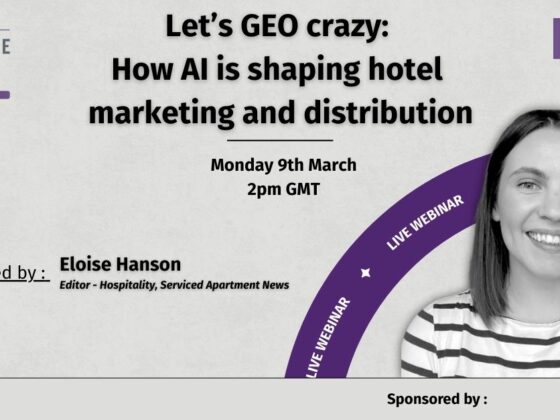CEO+AI is for travel leaders interested in AI strategy and business outcomes.
I met a girl last week. Her name is Fiona. You know those times when you meet someone, and afterwards you’re left feeling really impressed, enamored and/or grateful because he or she opened your eyes to something new? Maybe even transformative? That was the case here.
Fiona isn’t human, though. She’s an AI customer service rep for Hubspot. We’ll get back to her in a bit.
Rarely a day goes by when I don’t hear from someone or read about how “AI makes us less human.” For example, I’m working with a director of destination experience at a DMO to develop AI agents to help her keep up with a ton of emails she sends to partners every week. She’s concerned however that this process is going to make the correspondence seem less human.
I’m also working with a deputy mayor in a U.S. city who asked me to facilitate an AI workshop during an upcoming City Hall retreat. She said many of the civic leadership are behind with AI because, and this is a direct quote: “First, they don’t know how to use it. Second, they don’t know which tools to use. And third, they think AI is going to take over the world, right?”
It’s a constant lament. There’s even a whole new lexicon emerging to define how AI is changing the relationship between humans and tech: workslop, flowgramming, middleware, doomprompting, etc.
Whenever this theme of AI making us less human comes up, my first thought is always that this ship sailed decades ago. Many of us spend our days staring at a screen checking emails and sitting in virtual meetings while constantly being interrupted with endless notifications from any number of sources. And then with the intermittent bursts of time left over, we try to get some actual work done, right?
Meanwhile, away from work, there’s all the time we spend with streaming channels and social media. More than a few of us might be a bit embarrassed sharing the amount of time we’re passively scrolling from Project Runway on Hulu to AI influencers on TikTok fueled by our almighty algos.
I’m not exactly feeling superhuman, I have to say.
AI, when executed effectively, gives us some of our lives back to focus more on what makes life, life. Slack research shows that desk workers spend 41% of their day on menial tasks. That’s a lot. If AI can reduce a few of those hours, then I’m all here for it.
I was texting with an ex-CEO recently trying to make the case for that, and he only replied “lol.” I get why people dismiss or deride how AI can free up our time. That will change. It was the same way 20 years ago when DMO leaders said social media was only for kids and had no business value — “a solution looking for a problem,” as it were.
Agentic Commerce in Action
I’m not exactly sure the last time I was so excited about a customer sales experience, but Hubspot’s Fiona is something to celebrate. Last week I needed to get a CRM because I’m helping a client build agents to automate CRM workflows, and I wanted my own to test drive the process.
There are so many options to choose from, and I figured heading into the decision-making process that I was about to toss away a few hours of my life.
When you hit the free trial button on the Hubspot site, you’re directed to the above page where Fiona is waiting to chat with you to answer any questions about subscribing to the platform.
Or, as you can see above, there’s also a link to watch a pre-recorded demo video. I don’t know about you, but the thought of watching CRM demos just feels too deflating for words.
Fiona and I got to chatting. She answered some really basic questions I had about CRMs, showed me around the tool’s features, and explained the various pricing tiers.
The amazing part was how I was directing the conversation and the entire exchange was about, and only about, what I wanted to know, instantly. Zero wasted time and 100% value. It felt cathartic because talking with Fiona wasn’t a passive experience. I was in control of the sales dialogue, and that’s all kinds of refreshing.
Then again, maybe I wasn’t in control.
I went in seeking a free trial and ended up purchasing a year’s subscription. So who’s really in charge here? But Fiona gave me a hefty discount and then explained how to set up everything because I’m not very experienced with CRMs. So I’m cool with the $108 just for the experience of seeing the future of agentic commerce in action.
Actually it’s more than that. I got at least an hour of my life back that I didn’t expect, because the entire process was seamless, intuitive, highly informative, stress free and super fast. In fact, Fiona made buying a CRM almost fun.
I’ll take that any day over wading through pre-recorded demo reels or trying to phone a human.
During my years of consulting, I’ve facilitated a lot of strategic planning sessions with DMO teams that include a review of the organization’s values. By far, and then some, DMOs prioritize and evangelize being “Authentic” more than anything else, on average. That’s the most common and prized value that DMO staff pride themselves on.
The second most popular value is always “Innovative” or “Progressive” or something like that. I would suggest if your organization’s values include anything related to innovation, and you’re not investing in AI intentionally, you might consider changing that value to: “Overly Cautious” or maybe “Severely Risk Averse” or perhaps “Wait & See What Others Do, Always.” Something along those lines.
For many DMO staff still today, AI represents the opposite of authentic.
Last summer, I was presenting AI strategy to a group of Vancouver hoteliers. That morning, I came across something on my phone about a DMO that rebranded its Facebook Messenger channel. I was curious because Matador Network’s
GuideGeek AI
chat for DMOs integrates seamlessly with Meta’s social platforms: FB Messenger, WhatsApp and Instagram, as well as web.
The story about the rebrand made me think that this DMO’s Messenger channel was also AI powered. So I started chatting with it to find out.
As you can see in my presentation slide above, the DMO staff member is very human. What stands out for me most is the human’s very low opinion of AI.
I was reaching out to the DMO for information. I wasn’t looking to start a relationship. I just wanted what I wanted to know as quickly as possible because I was about to get on stage. Clearly, the human is well-intentioned and he is really trying to make a go of “connecting” with me.
But what keeps me up at night is I think that many people in late 2025 still feel that AI is evil because it makes us less human.
It depends on the use case. With this DMO app case study, I’m not sure the human is representing the best interests of the organization, but that’s a subjective opinion and maybe I’m wrong. Sure, if we were discussing Grindr, talking with a human is probably better.
I think we as an industry need to take a deeper look at how some of us characterize AI as always being a poor substitute for humans.
Then again, it won’t really matter in the near future. The Fiona’s of the world are going mainstream today. Agentic commerce is proving to drive conversions because humans want speed, reliability and value when engaging brands and seeking information for many types of purchase decisions.
For information about Matador Network’s industry leading GuideGeek AI chat platform for DMOs and their partners, visit brands.guidegeek.com.
For more information about the new Matador DMO AI Road Map, email greg@matadornetwork.com.







